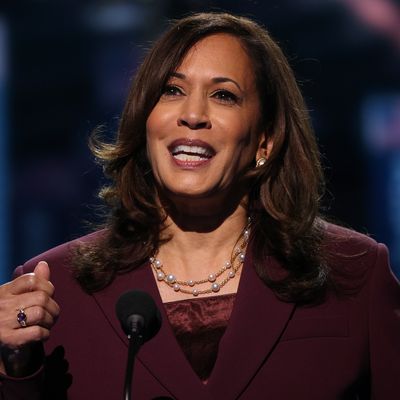
Standing behind the podium after hard-hitting speeches from Barack Obama, Hillary Clinton, and Nancy Pelosi — and perhaps in the shadow of a peerless address from Michelle Obama on Monday — vice-presidential nominee and U.S. senator Kamala Harris was probably wise to simply introduce herself to the country and enter the general election arena.
Political insiders were familiar with Harris’s personal story and career, but many viewers probably weren’t. So she presented herself as the product of a remarkable, but quintessentially American, immigrant family:
[M]y mother … Shyamala Gopalan Harris … came here from India at age 19 to pursue her dream of curing cancer. At the University of California Berkeley, she met my father, Donald Harris — who had come from Jamaica to study economics.
They fell in love in that most American way — while marching together for justice in the civil rights movement of the 1960s. In the streets of Oakland and Berkeley, I got a stroller’s-eye view of people getting into what the great John Lewis called “good trouble …”
[My mother] raised us to be proud, strong Black women. And she raised us to know and be proud of our Indian heritage. She taught us to put family first — the family you’re born into and the family you choose.
Given this convention’s emphasis on diversity and racial justice, Harris established herself as the Democratic ticket’s personal representative to the whole party, a position consistent with her ideological location smack in the middle of that party.
The traditional attack-dog role of vice-presidential nominees is one that Harris will likely soon adopt. But on this night when the last Democratic president took up the task of gravely accusing Donald Trump of unfitness for office and contempt for the constitution and democracy, she didn’t need to hurl any brickbats, other than this one sweeping accusation:
If you’re a parent struggling with your child’s remote learning, or you’re a teacher struggling on the other side of that screen, you know that what we’re doing right now isn’t working. And we are a nation that’s grieving. Grieving the loss of life, the loss of jobs, the loss of opportunities, the loss of normalcy.
And yes, the loss of certainty. And while this virus touches us all, let’s be honest, it is not an equal-opportunity offender. Black, Latino, and Indigenous people are suffering and dying disproportionately. This is not a coincidence. It is the effect of structural racism. Of inequities in education and technology, health care and housing, job security and transportation.
The injustice in reproductive and maternal health care. In the excessive use of force by police. And in our broader criminal justice system.This virus has no eyes, and yet it knows exactly how we see each other — and how we treat each other. And let’s be clear — there is no vaccine for racism.
That’s a line we are likely to hear again, and Harris is in a better position to deliver it than her 77-year-old white running mate.
The speech wasn’t terribly memorable, and her delivery has been better. Interestingly, her apparent nervousness dissolved when she spoke of her friendship with Beau Biden. You get the sense that her personal bond with Joe Biden may be stronger and more natural than one might expect.
If you had to describe the Kamala Harris we saw tonight with one word, it would be “happy.” She seems truly grateful for the opportunity to work for this ticket, and pick up the torch of generational leadership from both Obama and Biden. “Happy Warrior” is a term that has been applied to past Democratic candidates including Al Smith, Hubert Humphrey, and yes, even Joe Biden — so described by Obama in 2012. If she can maintain that persona, the brutal campaign trail ahead will rise to meet her.






























